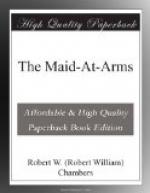“To be loved?”
“No, ... to love.”
I do not know how long our silence lasted; the faintest hint of silver touched the sky above the eastern forest; a bird awoke, sleepily twittering; another piped out fresh and clear, another, another; and, as the pallid tint spread in the east, all the woodlands burst out ringing into song.
In the house a door opened and a hoarse voice muttered thickly. Dorothy paid no heed, but I rose and stepped into the hallway, where servants were guiding the patroon to bed, and a man hung to the bronze-cannon post, swaying and mumbling threats—Colonel Claus, wig awry, stock unbuckled, and one shoe gone. Faugh! the stale, sour air sickened me.
Then a company of gentlemen issued from the dining-hall, and, as I stepped back to the porch to give them room, their gray faces were turned to me with meaningless smiles or blank inquiry.
“Where’s my orderly?” hiccoughed Sir John Johnson. “Here, you, call my rascals; get the chaises up! Dammy, I want my post-chaise, d’ ye hear?”
Captain Campbell stumbled out to the lawn and fumbled about his lips with a whistle, which he finally succeeded in blowing. This accomplished, he gravely examined the sky.
“There they are,” said Dorothy, quietly; and I saw, in the dim morning light, a dozen horsemen stirring in the shadows of the stockade. And presently the horses were brought up, followed by two post-chaises, with sleepy post-boys sitting their saddles and men afoot trailing rifles.
Colonel Butler came out of the door with Magdalen Brant, who was half asleep, and aided her to a chaise. Guy Johnson followed with Betty Austin, his arm around her, and climbed in after her. Then Sir John brought Claire Putnam to the other chaise, entering it himself behind her. And the post-boys wheeled their horses out through the stockade, followed at a gallop by the shadowy horsemen.
And now the Butlers, father and son, set toe to stirrup; and I saw Walter Butler kick the servant who held his stirrup—why, I do not know, unless the poor, tired fellow’s hands shook.
Up into their saddles popped the Glencoe captains; then Campbell swore an oath and dismounted to look for Colonel Claus; and presently two blacks carried him out and set him in his saddle, which he clung to, swaying like a ship in distress, his riding-boots slung around his neck, stockinged toes clutching the stirrups.
Away they went, followed at a trot by the armed men on foot; fainter and fainter sounded the clink, clink of their horses’ hoofs, then died away.
In the silence, the east reddened to a flame tint. I turned to the open doorway; Dorothy was gone, but old Cato stood there, withered hands clasped, peaceful eyes on me.
“Mawnin’, suh,” he said, sweetly. “Yaas, suh, de night done gone and de sun mos’ up. H’it dat-a-way, Mars’ George, suh, h’it jess natch’ly dat-a-way in dishyere world—day, night, mo’ day. What de Bible say? Life, def, mo’ life, suh. When we’s daid we’ll sho’ find it dat-a-way.”




